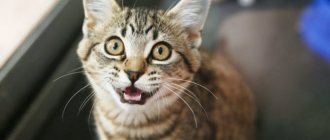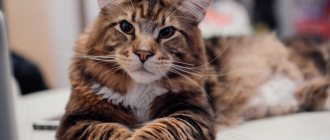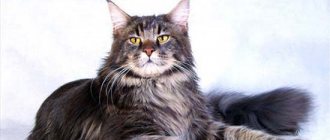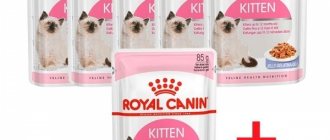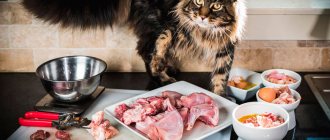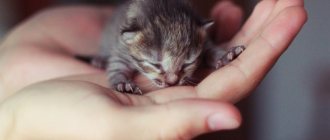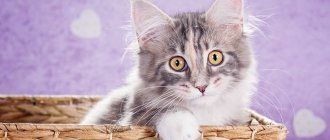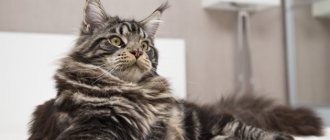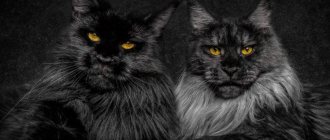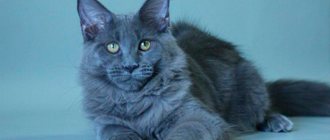Adult Maine Coons are famous for their large size and considerable weight for a domestic cat. And many people who have only recently become owners of babies of this breed are perplexed when looking at their funny, playful and still very small pet. Will he, too, someday turn into a huge, important and at the same time graceful cat? How do kittens grow and what factors can influence the size they eventually reach when they finally become adults?
Factors influencing growth
- Floor. Boy kittens grow faster than girl kittens and, as a result, when they finally mature, they reach larger sizes than their sisters.
- Genetics. Kittens from large parents are born with greater body weight and, as a rule, also grow up to be as large as their relatives.
- Physical condition of the newborn. Babies born weaker gain weight less quickly.
- Large litter size. Kittens from small litters are born larger than kittens from larger litters.
- Maintenance of mother kittens during pregnancy and while feeding offspring. If a mother cat eats properly and is kept in good conditions, then she produces healthy and strong offspring, which is the key to good growth and weight gain in babies.
- Stress. If there is a turbulent atmosphere in the house where the pet is growing up, if the owners are arguing, starting renovations, or something else is happening in their family that disrupts the usual rhythm of life in the house, then the kitten will gain weight worse due to strong worries.
- Past illnesses. Kittens that have recovered from the disease grow worse, and their growth may stop altogether for some time.
- Feeding. In order for a pet to grow well, it must eat properly and nutritiously.
Heredity depends not only on the mother of the kittens, but also on the father, so from different cats the same cat can produce offspring of different sizes.
Height and weight
In the first year of life, the Maine Coon actively grows and develops, and only in the second year does its growth slow down. If you were interested in the breed in advance and looked through photographs, you certainly had a question: how much does the kitten weigh? Some people call fantastic numbers, but don’t be alarmed. In fact, at 7 months the weight of a Maine Coon can be 4 kg , with proper and nutritious nutrition. The kitten resembles an adult not only in the photo, but also in its parameters.
The height of a Maine Coon at 7 months corresponds to its weight - if someone does not know that a purebred pet is roaming around your house, then you might think that this is an adult cat, but of a different breed. Again, such impressive results can only be achieved if your cat is fed and cared for properly.
Kitten development
During its maturation, a growing kitten goes through four stages of growth:
- Neonatal period. This is also the period of the newborn. It usually lasts 4 days. During this time, the daily weight gain of the cat's cubs depends on how easy their mother's birth was.
- Suction period. Lasts 1 month. During this time, kittens, on average, gain from 20 to 50 grams of weight daily.
- Transition period. It begins from the time the cat cubs begin to eat a little on their own and continues until about one and a half to two months (7-8 weeks of life). At this time, the rate of weight gain slows down somewhat.
- After the suckling period. The kittens are weaned from their mother, the cat, and feed completely on their own. They begin to gain weight and height again quite quickly. This stage lasts from approximately one and a half months until the little Maine Coon becomes a full adult.
Cats of this breed mature and gain weight until about the age of three.
They also grow up to the age of 3 years. It is during this period that physiological and psychological maturation occurs, as well as puberty. For about another year or two the cat will continue to “matrate.” Muscle mass will increase, he may gain a little weight, and his chest will expand. At the age of 4–5 years they are active and full of energy.
General size statistics for Maine Coons
A newborn baby often does not predict the large size of an adult. The body length of Maine Coons at birth is about 12 cm. They weigh from 100 to 150 grams . These are very standard parameters for kittens of all breeds. However, over time, the Maine Coon becomes longer, gaining muscle mass. And this happens quite quickly.
The length of the Maine Coon cat increases at a tremendous speed over the months, so nurseries do not even undertake to display any statistics. Much depends on the individual. Some cats grow faster, some more moderately. What can we say if sometimes the length of a Maine Coon cat at 5 months reaches half a meter .
© shutterstock
It is worth noting that a significant part in the size of such a pet is played by its large and fluffy tail. This “attribute” can be considered the cat’s pride. The tail length of a Maine Coon at maturity is usually about 36 cm.
Such parameters cannot but impress. And in combination with the total length of an adult individual, it sometimes reaches a whole meter.
Speaking of other parameters, everything is variable here too. For example, the height at the withers is about 33 cm. The chest in circumference is approximately 32 cm, and the waist is 31 cm. The average weight of an adult Maine Coon cat is 7.4 kg. In females this parameter reaches 6 kg. Due to the fact that the body length of this breed is quite large, they seem to be quite heavy. However, experts say that a healthy cat weighs no more than 10 kg.
Mass table by month
| Kitten age | Cat weight (in grams) | Cat weight (in grams) |
| 1 month | 630 - 750 g | 560 - 680 g |
| 2 months | 1230 - 1500 g | 1150 - 1400 g |
| 3 | 1800 - 2300 g | 1700 - 2300 g |
| 4 | 3000 - 3800 g | 2700 - 3600 g |
| 5 months | 3200 - 5500 g | 2900 - 3900 g |
| 6 | 3900 - 6500 g | 3200 - 4000 g |
| 7 | 4200 - 6500 g | 3500 - 4300 g |
| 8 | 4500 - 6900 g | 3800 - 4300 g |
| 9 | 5000 - 7000 g | 4100 - 5000 g |
| 10 | 5200 - 7500 g | 4200 - 5500 g |
| 11 | 5700 - 8000 g | 4300 - 6000 g |
| 1 year | 5700 - 9000 g | 4500 - 6300 g |
| 1.5 years | 6000 - 9500 g | 4500 - 6500 g |
| 2 years | up to 10,000 g | 4500 - 7000 g |
| 2,5 | up to 12,000 g* | 4500 - 7200 g |
| 3 | up to 13,000 g* | up to 7500 g |
* Up to 12,000 - 13,000 g - the weight of adult castrated cats.
What to do if the kitten is not gaining weight?
If the kitten has stopped gaining weight, first of all, you need to find out the reason why this is happening. If a slight weight gain is associated with improper feeding (possibly from the breeder), then the new owner of the furry baby needs to take the following measures:
- Add more high-calorie foods to your pet's food, and also increase the amount of animal proteins.
- If your pet eats ready-made food, then you can try to switch it to food richer in proteins and higher in calories, preferably of a better class than the previous one.
- Start giving your pet vitamin and mineral supplements (preferably complex ones, which contain the entire necessary set of microelements).
Without consulting a veterinarian, you should not give your kitten biologically active additives to increase appetite or, especially, drugs that artificially increase body weight.
Also, in all cases, if a kitten’s poor weight gain is not related to nutrition, but to reasons other than genetic, it makes sense to take the pet to a veterinary clinic for a consultation and examination.
Normal weight of a Maine Coon kitten by month from birth to one year
From the moment of birth until full development, the Maine Coon changes greatly in size. In the early stages, boys and girls do not differ much in weight, but the difference appears sharply at a certain stage.
- The initial stage is counted from the moment the kitten is born. It lasts only 4 days after birth, but it is during these days that the future state of the baby’s health is determined. He must receive all the vitamins, so it is important to take care of the mother's health. It is impossible to say exactly how much the baby will grow, since this factor is individual for everyone and depends only on the condition of the kitten after birth.
- This stage lasts much longer than the first - 4 weeks. The individual gains weight steadily and on an ongoing basis. In general, 20-50 g per day. By the end of the month of life, kittens of the same litter equalize in height and strength, underdeveloped kittens are restored to healthy individuals. The weight of a one-month-old kitten can be up to 1 kg, in the second month the maximum weight estimate is 1.5 kg.
- The next stage lasts until seven weeks of age. The obvious difference from the other stages is that there is a transition to solid food. At this stage, a slowdown or a sharp increase in weight is possible - it is difficult to predict, it depends on the individual characteristics of the breed. By the seventh week, this transitional stage ends, and body weight increases again. The kittens will begin to gain weight, because the new diet should contain all the necessary microelements and vitamins.
- Stage four. "After the sucker." This stage lasts until the animal's growth is complete.
| Age | Cat, weight in grams | Cat, weight in grams |
| 7 days | 240 -260 | 240 — 290 |
| 14 days | 320 — 410 | 340 — 420 |
| 1 month | 550 — 740 | 640 – 820 |
| 2 months | 1000 — 1400 | 1100 — 1500 |
| 3 months | 1600 — 2200 | 1800 — 2400 |
| 4 months | 2600 — 3500 | 3000 — 3800 |
| 5 months | 2800 — 4300 | 3200 — 5500 |
| Six months | 3200 — 4500 | 3900 — 6000 |
| 7 months | 3400 — 4900 | 4200 — 6500 |
| 8 months | 3700 — 5200 | 4500 — 6900 |
| 9 months | 4000 — 5400 | 5000- 7000 |
| 10 months | 4100 — 5800 | 5200 — 7700 |
| 11 months | 4200 — 6100 | 5700 — 8000 |
Further growth occurs to the size of an adult male/female. By the 3rd year of life, the pet should gain full weight, which will not change after that.
Natural nutrition table by month
| Kitten age | Authorized products | Daily Recommended Value |
| 1 month | - mother's milk - liquid porridge with milk | Six times a day |
| 1.5 - 2 months | - mother's milk - ready-made milk formula for kittens - liquid porridge with milk - scraped meat, scalded with boiling water, but not boiled | Six per day, approximately 120 - 150 grams per day |
| 3 – 6 months | - ready-made milk formula for kittens - liquid porridge with milk - thin meat puree - scraped meat, scalded with boiling water, but not boiled | Four times a day, approximately 190 - 245 grams per day |
| 6 – 9 months | - liquid porridge with milk — dairy products: kefir, milk, sour cream - thin meat puree - low-fat natural cottage cheese - yolk (boiled or raw) - lean meats | Three times a day, approximately 200 - 250 grams per day. |
| 10 - 12 months | — dairy products: milk, kefir, fermented baked milk, low-fat natural yogurt, sour cream, cheese - thin meat puree - liquid porridge with milk - vegetables - boiled fish - low-fat natural cottage cheese - eggs (white - only boiled, yolk can be given raw) - lean meats | Twice a day, approximately 150 - 200 grams per day |
Feeding kittens with prepared food
Feeding your pet prepared food has many benefits. In particular, it makes it easier to choose the right diet and relieves the owner of the need to prepare food for the cat. However, the following recommendations must be observed:
- The food should be appropriate for the age of the kitten and, if possible, the breed.
- It must be of high quality - no lower than premium class.
- For the first time after arriving in a new home, the kitten should eat the same as in the breeder’s home. If he ate ready-made food, then you need to try to find exactly the same one and feed the baby with it.
- Transfer to another food can begin after the period of adaptation to the new home has been successfully completed. At the same time, you cannot immediately transfer the Maine Coon to a new food; the transition should be carried out gradually.
- You cannot combine feeding with prepared food and natural food. The kitten must eat one or the other.
- Up to 1.5 years of age, the pet can be fed with dry food for kittens; later, it is recommended to switch the Maine Coon to food designed for adult animals.
It is necessary to strictly follow the daily quantity and serving size recommended by the food manufacturer.
Why can a Maine Coon lose weight?
Body weight standards affect the portion of food that domestic coons should receive. If suddenly your pet begins to lose body weight, this may indicate the presence of health problems. It is important to take action in time and contact a veterinarian. Typically, there are many reasons for weight loss:
- change in diet or diet;
- poor nutrition;
- use of low-quality products;
- worms or other parasites;
- hereditary factors;
- hormonal imbalances;
- poor animal hygiene;
- serious illnesses.
At the first signs of weight loss, it is worth paying attention to the animal’s diet. Perhaps it is not receiving enough necessary nutrients. If there have been no changes in the diet, the cause may be the stressful state of the coon. In any case, weight loss is most often due to health problems. In this case, only specialists can help and immediately prescribe adequate treatment.
Material on the topic: all about the character and habits of Maine Coons.
Maine Coon kitten.
Complications from overeating
Overeating is not good for your cat. It leads to obesity and related diseases. An overfed pet may develop heart, liver, lung, stomach or intestinal diseases. Diseases of the musculoskeletal system may also appear, which negatively affects the activity and general well-being of the cat. Overeating and excessive weight gain contribute to the likelihood of developing cardiomyopathy, dysplasia or spinal muscular dystrophy, to which representatives of this breed may already be predisposed.
The maximum weight that a healthy, non-obese and uncastrated cat can have is 10 kg.
